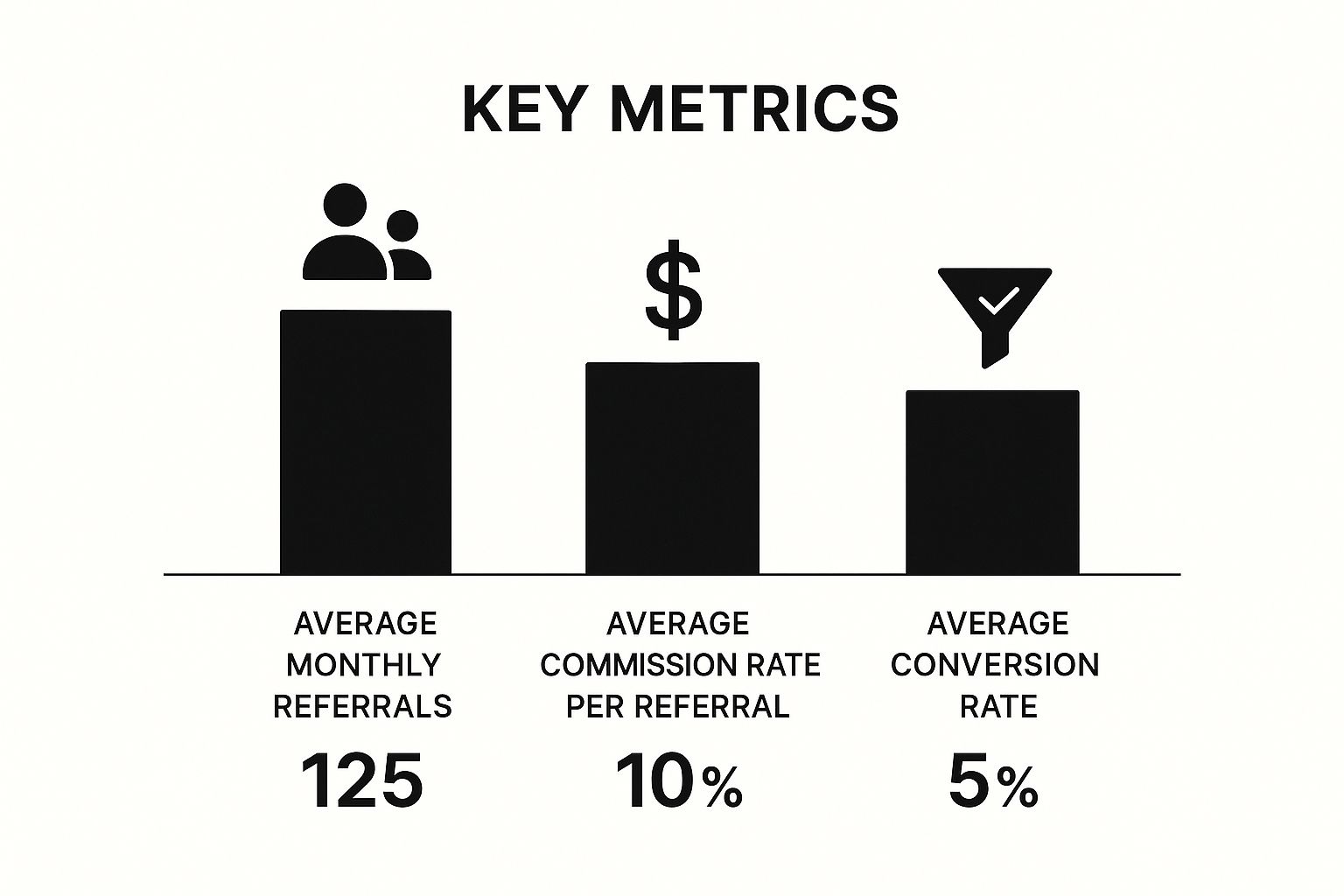The Trust Economy: Why Referral Marketing Actually Works

Consumers today are constantly bombarded with advertising, leading to increased skepticism towards traditional marketing. This presents a challenge for businesses trying to attract new customers. However, within this climate of distrust, a powerful new dynamic has emerged: the trust economy. This is where referral marketing truly shines.
Referral marketing operates on a basic principle: people value recommendations from people they trust. This trust is the driving force behind referral marketing's effectiveness as a source of income. Consider this: are you more swayed by a billboard advertisement for a new restaurant, or a glowing review from a friend? This illustrates the potent impact of amplified word-of-mouth marketing.
The Power of Authentic Recommendations
One of the most impactful strategies for generating income through referrals lies in harnessing their inherent trust and influence. In fact, 92% of consumers place greater trust in referrals from friends and family than in any other advertising format. This translates to higher conversion rates, with referrals boasting 3-5X higher conversion rates than other marketing avenues. Within the U.S., 52.2% of small businesses cite referrals as their most successful marketing tool. Find more detailed statistics here. These figures highlight the remarkable effectiveness of leveraging this ingrained trust.
By tapping into these established networks of trust, you significantly boost the likelihood of a successful referral. It's akin to having a dedicated team of trusted advocates championing your cause.
The Difference Between Authentic and Promotional
It's vital to distinguish between genuine recommendations and overt promotions. Authenticity is paramount for successful referral marketing. People can easily detect a forced or disingenuous referral, which can undermine your credibility and even damage relationships.
Imagine a friend incessantly promoting products to you, regardless of their relevance. This quickly becomes irritating and erodes trust. Focus instead on offering genuinely helpful recommendations. A referral should feel organic and beneficial, not pushy, stemming from a genuine belief in the product or service and its potential value to the recipient.
Why Businesses Pay For Quality Referrals
Businesses recognize the value of authentic recommendations. They are willing to pay a premium for quality referrals that circumvent the typical resistance to traditional marketing. This is because referrals often result in higher customer lifetime value. Referred customers tend to exhibit greater loyalty and higher spending compared to those acquired through other channels.
Furthermore, referral marketing is often more cost-effective than other advertising forms. This is especially appealing to businesses aiming to maximize their return on investment. This blend of effectiveness and efficiency makes referral marketing mutually beneficial for businesses and those earning through referrals. This growing trust-based economy is creating more opportunities for individuals to earn through authentic recommendations.
Five Referral Paths That Actually Generate Income
Beyond generic advice, let's explore specific referral programs that consistently yield positive results. We'll analyze the most accessible and profitable referral channels available, using real-world examples and practical assessments. For more inspiration, check out these Referral Program Ideas. You'll discover which program types best suit your personality and sphere of influence, from subscription services with recurring commissions to financial products offering substantial one-time bonuses. Each path includes realistic income potential, practical starting points, and insights from individuals who have successfully monetized these channels. We'll separate hype from reality, revealing which opportunities provide sustainable income versus occasional supplemental earnings.
Software and SaaS Referrals
The Software as a Service (SaaS) industry thrives on referrals, thanks to its recurring revenue model. Many SaaS companies offer generous recurring commissions, paying you a percentage of each payment for as long as your referral remains a customer. This creates a passive income stream over time. Project management software and email marketing platforms are prime examples of SaaS products with lucrative referral programs.
Financial Products and Services
Financial products, including banking, investment, and loan services, often provide high-value, one-time commissions for successful referrals. While you won't receive recurring payments, the initial payout can be substantial. Some programs offer bonuses ranging from $50 to $500, or even more, per referral. However, promoting financial products requires a higher level of trust and understanding given the inherent risks involved.
E-commerce and Retail Referrals
Many online retailers utilize referral programs to acquire new customers and reward loyal ones. These programs can offer percentage-based discounts or fixed-amount gift cards. This path is particularly effective if you have a strong online presence or influence within a specific niche. Fashion bloggers or tech reviewers, for example, can successfully monetize referrals by recommending products they genuinely use and value.
Online Courses and Education Platforms
The rising popularity of online learning has created numerous referral opportunities. Platforms offering courses, workshops, or educational resources often provide attractive commissions for new students enrolled through a referral link. This can be a great option if you are passionate about a subject and have an audience interested in learning more.
Web Hosting and Domain Registrars
Web hosting companies and domain registrars frequently use referral programs as a core growth strategy. These services are essential for building an online presence, ensuring consistent demand. Referral commissions in this area can be one-time or recurring, depending on the provider.
To help illustrate the potential of various referral programs, the following table compares different types based on several key factors. This will allow you to better assess which program aligns with your individual circumstances and goals.
Top Referral Program Types Comparison
| Program Type | Average Commission | Payment Structure | Barrier to Entry | Time Investment |
|---|---|---|---|---|
| Software/SaaS | 5-30% of recurring revenue | Recurring | Low to Medium | Low (Initial Setup) |
| Financial Products | $50-$500+ per referral | One-time | Medium to High | Medium |
| E-commerce/Retail | 5-10% of sale or fixed amount | One-time or Recurring | Low | Low |
| Online Courses | 10-30% of course price | One-time or Recurring | Low to Medium | Low |
| Web Hosting/Domains | $25-$100+ per referral | One-time or Recurring | Low | Low |
As this table demonstrates, each referral program type offers different potential in terms of commission structure and ease of entry. Consider these factors alongside your own resources and network when choosing the best fit for your referral strategy.

The infographic above provides a visual representation of how average monthly referrals, commission rates, and conversion rates vary across referral program types. While some programs may offer higher commission rates, others boast better conversion rates. Finding the right balance between commission structure and audience engagement is key to choosing the most effective referral path. Building sustainable referral income requires a strategic approach, considering both the potential payout and the likelihood of conversion within your chosen niche.
Crafting Your Personal Referral Strategy

Now that we've explored different ways to earn referral income, let's create a strategy tailored to your strengths and network. This involves understanding your sphere of influence and finding referral opportunities that genuinely resonate with you and your audience. This personalized approach is crucial for building a sustainable income stream.
Identifying Your Sphere of Influence
Begin by mapping out your network. This includes friends, family, colleagues, online communities, and social media connections. Think about their interests, needs, and what products or services they might find valuable.
For example, recommending SaaS products or web hosting services might be a good fit if your network is tech-savvy. However, if your connections are more interested in personal finance, referrals related to banking or investment platforms might be more effective.
Matching Opportunities With Your Audience
A great way to generate referral income is through well-structured Affiliate Programs. After identifying your sphere of influence, research programs that align with their interests. Consider the commission structure, the company's reputation, and the quality of the offerings.
Choosing programs you genuinely believe in makes your recommendations more authentic and persuasive. Want to expand your affiliate marketing reach? Check out this resource on How to Get Affiliates.
Balancing Promotion With Genuine Value
Earning money through referrals relies on balancing promotion with genuine value for your network. Your recommendations should always feel helpful and relevant, never pushy. Focus on sharing valuable content related to the product or service.
This could include reviews, tutorials, or case studies showcasing the benefits. For instance, if you recommend a project management tool, share a blog post about how it streamlined your workflow. This builds trust and positions you as a resource, increasing conversion rates.
Tracking Performance and Maintaining Authenticity
Tracking your referral performance across different programs is essential. This helps you identify what's working and adjust your strategy. Use spreadsheets or dedicated referral tracking tools to monitor clicks, conversions, and earnings. This data offers valuable insights into your audience's preferences.
Referral marketing isn't just about new customers; it also reduces costs and improves lead quality. Forrester reports that referral marketing reduces customer acquisition costs by 35%. Gartner found that referral programs generate 43% higher quality leads than traditional methods. Harvard Business Review also found these programs deliver 4x higher ROI than digital advertising. Learn more about these statistics here.
While tracking performance is important, maintaining authenticity is paramount. Prioritize your relationships and avoid compromising your credibility for short-term gains. By focusing on genuine value and building trust, you can create a sustainable referral strategy that benefits everyone.
Digital Platforms That Amplify Your Referral Reach

Selecting the right digital platforms is essential for maximizing your referral income. Different platforms cater to various audiences and content formats. By understanding these nuances, you can strategically use each channel to broaden your reach and improve conversions. This focused approach ensures your referrals connect with the right people at the optimal moment.
Matching Your Message With the Right Medium
Just as you tailor your referral strategy to your audience, you should also adapt your communication style to each platform. Social media platforms like Instagram thrive on engaging visuals and concise messaging. A captivating image showcasing a product’s advantages, combined with a short, powerful caption, can be incredibly effective. Email, on the other hand, allows for more detailed explanations and personalized suggestions. A well-written email can provide helpful context and build stronger relationships with your audience, fostering trust and increasing conversion rates.
Platform-Specific Strategies for Referral Success
Social Media: Share genuine experiences with products or services. Create visually appealing content and engaging stories to grab attention. Run contests or giveaways to encourage sharing your referral links. For example, offering a discount to both the referrer and the referred friend can significantly boost participation and create excitement.
Content Creation (Blog Posts, Videos): Incorporate referral links organically within valuable content. Offer tutorials, reviews, or product comparisons that highlight the benefits of the product or service. If you're recommending a SaaS product like Refgrow, develop a blog post explaining its advantages for SaaS businesses. Integrate your referral link seamlessly within the content, making sure it adds value to the reader’s experience.
Email Outreach: Categorize your audience based on their interests and personalize your email messages accordingly. Highlight specific benefits that resonate with each segment. For instance, if you know a particular group is interested in affiliate marketing, create a targeted email explaining how Refgrow can streamline their affiliate program.
Messaging Apps: Share referral links directly with individuals or small groups who’ve shown interest. Give personalized recommendations and answer any questions they might have promptly. Be mindful of not spamming contacts with unwanted messages.
To illustrate the effectiveness of different digital platforms, let's take a look at the following table:
Digital Platform Effectiveness for Referrals This table shows the effectiveness of different digital platforms for referral marketing based on engagement rates and conversion potential.
| Platform | Best For | Audience Engagement | Conversion Rate | Content Format |
|---|---|---|---|---|
| Visual Products/Services | High (Images, Stories) | Medium | Images, Short Videos, Captions | |
| Diverse Products/Services | Medium (Shares, Comments) | Medium | Text, Images, Videos | |
| News/Updates, Quick Promos | Medium (Retweets, Replies) | Low | Short Text, Links, Images | |
| Personalized Recommendations | Medium (Opens, Clicks) | High | Text, Images, Personalized Links | |
| Blog Posts | In-depth Reviews/Tutorials | High (Comments, Shares) | Medium | Long-form Text, Images, Videos |
| YouTube | Product Demos/Tutorials | High (Views, Comments) | Medium | Videos |
| Messaging Apps | Direct, Personalized Offers | High (Direct Replies) | High | Text, Links |
As the table shows, different platforms offer varying levels of engagement and conversion potential. Choosing the right platform depends heavily on your target audience and the type of content you're sharing.
Tracking, Transparency, and Trust
Tracking your referral link performance is crucial for optimizing your strategies. Use link shortening tools with tracking features to monitor clicks and conversions on each platform. This data will highlight the most effective channels. Maintaining transparency with your audience by disclosing your affiliate relationships is also essential. This practice builds trust and strengthens your credibility.
Compelling Calls to Action
Finally, create clear and engaging calls to action that encourage clicks on your referral links. Offer incentives such as discounts or exclusive content to motivate conversions. Make sure your calls to action comply with each platform's guidelines and avoid overly pushy or misleading language.
Avoiding the Referral Mistakes That Cost You Money
Generating substantial income through referrals requires a strategic approach. It's not enough to simply share links. You need to understand your audience and avoid common pitfalls that can damage both your earnings and your reputation. Let's explore these critical mistakes and how to steer clear of them.
The Pitfall of Pushy Promotion
One of the biggest mistakes is being overly promotional. Constantly bombarding your network with referral links can be a major turn-off. Instead of building trust and encouraging conversions, you risk alienating your audience and damaging valuable relationships. For effective digital strategies, looking at various influencer marketing campaign examples can offer helpful insights.
Instead of pushing, focus on providing genuine value. Share helpful content and offer insightful recommendations. Only introduce referral links when they genuinely fit the context. This approach fosters trust and positions you as a valuable resource, not just a salesperson.
Ignoring Disclosure Requirements
Transparency is paramount in referral marketing. Failing to disclose your affiliate relationships can lead to legal problems and damage your credibility. Always be upfront about your partnerships and clearly indicate when you are sharing a referral link. Mastering referral program best practices is crucial. This builds trust with your audience and ensures ethical operation.
Prioritizing Quick Commissions Over Quality
While earning quick commissions can be tempting, promoting low-quality products or services for short-term gain will ultimately backfire. It damages your reputation and erodes the trust your audience has placed in you. Focus instead on long-term growth by prioritizing quality referrals.
Recommend products or services you genuinely believe in. Ensure they align with your audience's needs. This approach builds a sustainable referral income stream based on trust and genuine value.
Neglecting to Track and Analyze
Failing to track your referral performance is like navigating without a map. You won't know what strategies are working, what needs improvement, or how to optimize your approach. Use dedicated tracking tools or even spreadsheets to monitor clicks, conversions, and earnings from different programs.
Analyzing this data offers valuable insights into your audience's preferences. This allows you to refine your approach for maximum effectiveness. By tracking and analyzing your results, you can continually improve your referral strategies and maximize your earning potential.
Scaling From Occasional Commissions to Reliable Income
Building a sustainable income stream from referral marketing takes more than just sporadic effort. It requires a strategic approach, focusing on systematizing processes, building a strong personal brand, and continually optimizing your strategies. This shift transforms occasional commissions into a dependable income source.
Systematizing Your Referral Efforts
Think of successful referral marketing as a well-oiled machine. Every part needs to work together efficiently, starting with organization. Implementing a Customer Relationship Management (CRM) system, such as HubSpot, allows you to track referrals, monitor communication, and segment your audience by interest. This facilitates targeted recommendations and personalized messaging, boosting conversion rates.
Creating a content calendar helps schedule promotional efforts across different platforms. This ensures consistent engagement and prevents overwhelming your audience with sporadic promotions. Consistent, valuable content keeps your audience engaged and receptive to recommendations.
Building a Content Ecosystem
Instead of simply scattering referral links, create valuable content around your recommendations. Build a content ecosystem that positions you as a trusted resource in your niche. For example, if promoting project management software like Asana, develop blog posts, tutorials, or case studies showcasing its benefits.
This strategy establishes your expertise and provides context for your referrals. It demonstrates the value of the products or services you recommend, making your audience more likely to convert. Building trust and authority makes your referrals more impactful.
Building Your Personal Brand
Establishing yourself as a trusted source in your niche is crucial for long-term success in referral marketing. This involves consistently delivering valuable content, engaging with your audience, and building a strong online presence. Think of yourself as a micro-influencer, curating recommendations tailored to your audience’s needs.
This positions you as more than just a salesperson; you become a trusted advisor. Your referrals carry more weight because they come from a recognized authority. This strengthens your brand and increases earning potential.
Managing Growth and Legalities
As your referral income grows, proper financial management becomes essential. Implement meticulous tracking systems for tax purposes, ensuring accurate reporting of your earnings. Consider reinvesting a portion of your income to scale your efforts, whether it involves hiring virtual assistants, investing in premium marketing tools, or expanding content creation.
As your income reaches a certain level, exploring the formation of a business entity might be beneficial for liability protection and tax optimization. Consult with a legal and financial professional for guidance on these matters.
Turning Referrals into a Business
For those serious about turning referral marketing into a full-fledged business, consider expanding your reach and influence. Develop partnerships with complementary businesses to cross-promote offerings. Create premium content, such as online courses or exclusive webinars, that can be monetized through referrals.
By treating referral marketing efforts like a business, you can unlock greater earning potential and build a sustainable income stream. This transition from occasional earner to entrepreneur requires dedication, strategic planning, and a commitment to building long-term value.
Ready to supercharge your referral marketing and build a thriving SaaS affiliate program? Refgrow makes it easy to embed a powerful affiliate system directly within your product. Check out Refgrow today! and unlock the potential of your existing customer base.
